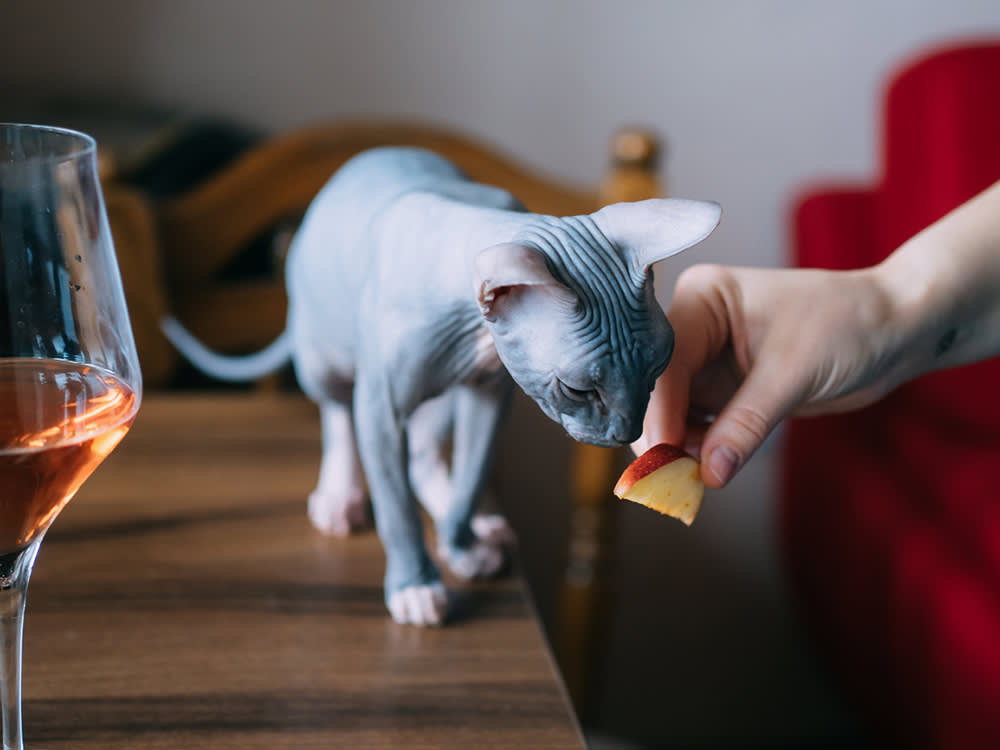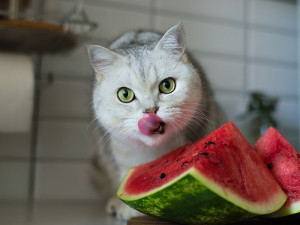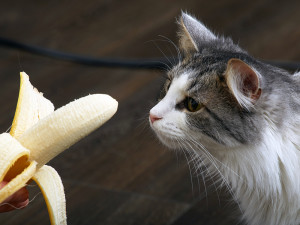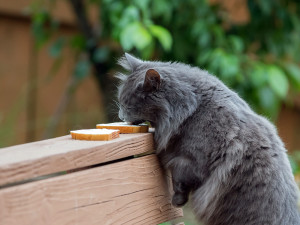It’s hard to argue with the health benefits of apples. Does that mean an apple a day will keep the veterinarian away? Not so much. But apples are safe for cats to eat, so go ahead and offer your cat a small piece of your Granny Smith.
Nutrition facts: Apples for cats
Are apples good for cats?
Apples are a great source of fiber and vitamin C and linked to reduced risk of stroke, high blood pressure, and diabetes.
Can cats eat apples?
While fresh apples cut into small pieces are safe, apple seeds are off limits. The seeds contain small amounts of cyanide, which are toxic. Your cat would need to consume a lot of seeds to feel the effects, but it’s always better to use caution. “Given apples can be harder to chew, always cut them into bite-size pieces before feeding to your cat,” cautions Dr. Tina Wismer, senior director of the ASPCA Animal Poison Control Center. The apple core is off limits, too, as Dr. Wismer notes that it’s a potential choking hazard.
Are apples completely safe for cats?
Dogs may be drawn to the sweetness of apples, but cats lack the receptors to detect sweet flavor, so apples may not be that appealing. If your cat is interested, it’s okay to offer a few bites — unless your cat has health issues. Apples are high in natural sugar, which makes them off-limits for cats with diabetes.
How much do you spend on your pet per year?
Never feed your cat apple pie, applesauce, apple juice, or other processed foods made with apples. The fruit itself might be safe but added ingredients like eggs, sugar, and dairy products could be unsafe for cats. These processed foods also add a lot of unnecessary calories to your cat’s diet, putting them at risk for health issues like pancreatitis, diabetes, and arthritis.
Anytime you introduce new foods, including apples, watch for symptoms like vomiting and diarrhea, which are signs that the fruit is causing stomach upset. If your cat has no reaction to apples, it’s okay to occasionally slip them a few slices.
Other fruits that are good for cats
Peaches: Yes, cats can eat peaches (in small amounts), but then again, you might not want to share a perfect summer peachopens in new tab!
Strawberries: Strawberries are chock full of fiber, vitamin C, potassium, and antioxidants, and make a safe treat for your catopens in new tab.
Blueberries: For such small berries, blueberries pack a big nutritional punchopens in new tab, and are safe to feed to your kitty, to boot.
Other fruits that are not good for cats
Grapes: All grapes and raisins are highly toxic for catsopens in new tab, and should not be given to them under any circumstances.
Pomegranates: Though pomegranate fruit is safe for cats to eat, the seeds pose a choking hazard, and should be avoidedopens in new tab.
Tomatoes: Unripe tomatoes contain unsafe amountsopens in new tab of tomatine and solanine, which can be toxic for cats.
The bottom line: Human food for cats
Cats can eat apples, but only in moderation. Like all treats, apples should only be given to your cat as a supplement to their complete and balanced cat food diet.
FAQs (People also ask)
Can cats eat apples?
Yes, cats can eat apples. However, they lack the receptors needed to detect sweetness, and so apples might not actually be that appealing to them.
Is it OK to give cats apples?
Yes, it is OK to give cats small pieces of apple. However, apple seeds and processed foods made from apples, such as applesauce, should be avoided.
Why do cats like apples?
Many cats actually do not like apples! Unlike dogs, it is difficult for a cat to taste sweet things, and so they might not enjoy eating a sweet and juicy apple.
Can cats eat apple seeds?
No. Apple seeds contain small amounts of cyanide, which is toxic, and so they should be avoided.
References
The Nutrition Source: Applesopens in new tab
Apples 101: Nutrition Facts and Health Benefits








